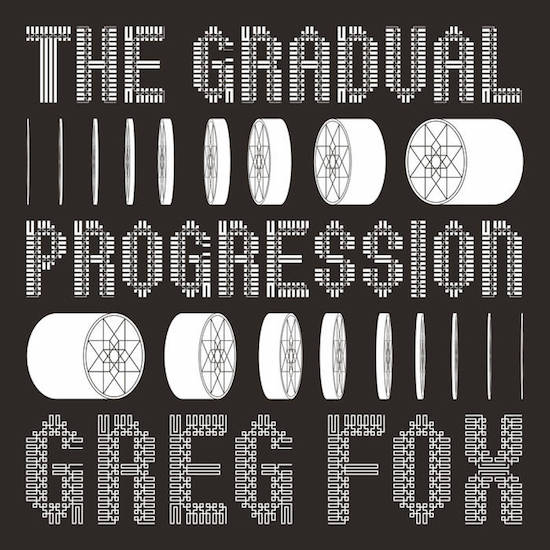As an instrumentalist, Greg Fox is nothing if not fearless. His drumming style in and out of his best-known projects Liturgy and Guardian Alien has always been an intriguing and, dare I say it, unique prospect. A mixture of black metal fury and jazz fusion pyrotechnics for sure, but there’s something in the way he fluidly flits between these idiomatic techniques and a kind of rapidly rolling, free-fire playing style that is hard to place in any other drummer. He deals in those moments where the mind becomes unable to catch up with the percussive detail it receives, and that’s why he’s always been seen as so much more than a rhythm-keeper.
But how does he fare when at the helm of a project? For The Gradual Progression, Fox has enlisted the help of a technological development made by a friend: ‘Sensory Percussion’ allows him to trigger sequenced synth lines by hitting the skins of his drums. It’s certainly an interesting idea, essentially allowing the drummer to accompany himself with prefigured melodic material. Where the album falls down, however, is where Fox over-relies on this this technology. The melodic structures he’s mapped out for himself can be interesting – such as in the sombre chord progressions on ‘Earth Center Possessing Stream’ – but they often feel meandering and forgettable when presented on their own.
This issue could perhaps have been helped by putting the Sensory Percussion synths a little higher in the mix. Indeed, the textures Fox employs on the album’s opening number – flurrying synth strings and modular blips – are a little muddy and are almost lost among the percussive rumble. Things are much more interesting when he employs other musicians, the strange juxtaposition of fingerpicked acoustic guitar and snaking saxophone against Fox’s drum-triggered synthetic backdrop on ‘By Virtue of Emptiness’, for example, providing a mysteriously swirling and involving sound-world.
Fox has cited Don Cherry and Pharoah Sanders as influences in the making of this album, and the parallels are certainly interesting. There’s definitely a similar search for abandon in Fox’s rapid, complex fills, but his is a much more muscular and precise approach to transcendence through free playing. While spiritual free jazzers often seem like they’re opening themselves up to allow the holy ghost to flow through them as music, in all his rhythmic precision and muscularity of playing, Fox feels like he’s propelling himself into the spiritual realm by virtue of his own exertions alone. Additionally jazz, especially the spiritual jazz that Fox references, is all about interplay – the sound of instrumentalists slipping and sliding over each other’s movements. Fox’s Sensory Percussion, in which the synths are triggered by drums and so are sounded simultaneously, doesn’t allow for this, and so things really are much more immersive when other players join the fray.
A blink-and-you’ll-miss-it work with only six mid-length tracks, The Gradual Progression picks up greatly in the second half. ‘Catching an L’ seems to have a much greater sense of purpose, with a brash, squelchy bass line and discombobulated saxophone underpinned by a rhythm that manages to be at once head-nodding and mind-bendingly complex, while the rave-y synth stabs that bookend the piece place the work in a rather tripped-out mental space. ‘My House of Equalizing Predecessors’, meanwhile, is a headrushing ride through blastbeats and burbling ambience – black metal gone native in a jungle of new age synths, replete with its own flock of electronic twitters. Album closer ‘OPG’ sees a sawing bowed bass being tortured for its harmonics with synth ostinatos pulsing further into the sonic distance. And I better you never thought you’d hear Greg Fox go motorik.
In the imagery they employed, Guardian Alien mixed a spiritual outlook with cosmic whimsy to the extent that one wasn’t entirely sure whether they were taking the piss or not, even though the music told a different story. With The Gradual Progression, one definitely gets the sense that Fox is making an unselfconscious attempt to forge forward with music, an unabashed statement for progression. Though it’s not entirely successful, one has to admire this kind of ambition. He’s made an album that’s hard to describe in both generic and theoretical terms, and for that we should thank him. I, for one, would love to see him take this attitude, along with the Sensory Percussion employed on this album, to renewed efforts with collaborators.


